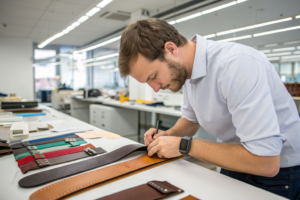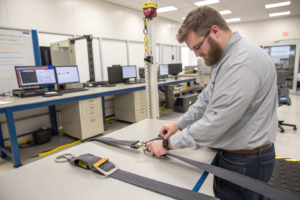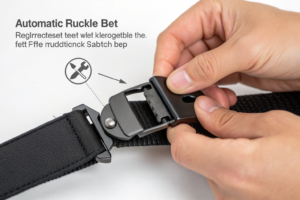When you try to source belts or fashion accessories from Chinese factories, one of the first hurdles is the sample cost. Many buyers get frustrated when they feel they are overpaying just to test a product. The truth is that sample costs are negotiable, but only if you understand the logic behind them and know how to approach the conversation.
The best way to negotiate sample costs with Chinese belt factories is to build trust, understand their production logic, and offer something in return. When buyers show long-term commitment, suppliers are often willing to reduce or waive sample fees. The key is to frame the negotiation as a partnership instead of a one-time transaction.
Factories value buyers who think beyond just "cheap samples." If you show seriousness, professionalism, and willingness to invest in a real order, then the sample cost becomes a smaller issue for both sides. In the next sections, I will share practical steps and strategies to help you negotiate effectively and avoid unnecessary costs.
Why Do Chinese Factories Charge for Samples?
Factories are not charging sample fees simply to make money off you. They do it to cover raw material costs, production time, and labor. In fact, high-quality belts require detailed craftsmanship, and making one or two pieces is often more costly per unit than mass production.
Chinese belt factories charge sample costs to protect their resources and ensure only serious buyers request samples. By asking for a fee, they filter out casual inquiries and reduce wasted time.

Do sample costs reflect product quality?
Yes, in most cases. If a factory is using real cowhide leather or premium buckles, the sample will be made with the exact same materials as in bulk orders. This ensures you can evaluate their quality standards before placing a large order. You can explore more about genuine leather belts and how material quality affects pricing. Another good resource is this belt manufacturing process guide.
Are sample costs refundable?
Many reputable suppliers will deduct the sample fee from your bulk order once the order is confirmed. This is a standard industry practice in China, especially for buyers from Europe and North America. You can check further insights on global sourcing best practices and refund policies in international sourcing.
How Can Buyers Reduce or Waive Sample Fees?
The truth is that sample costs are negotiable, but your strategy matters. You must show that you are a serious buyer who understands the value of the factory’s work. Small gestures can make a big difference.
Buyers can reduce or waive sample fees by building trust, showing clear commitment to future orders, and offering something valuable in return. This could be order volume, faster decisions, or even long-term partnership.

Should you ask for free samples immediately?
No, that can damage trust. Instead, explain your project scope, target market, and expected order quantity. Once the factory sees you are serious, they may waive the cost voluntarily. For reference, read this guide to negotiating with Chinese suppliers and this Alibaba sample request process.
What alternative solutions can you offer?
Some buyers ask for digital mockups or cheaper material samples before requesting full production samples. This reduces costs for both sides. Learn more about product prototyping and 3D mockup solutions. These tools can help avoid unnecessary physical samples.
What Negotiation Tactics Work Best With Chinese Factories?
Negotiating in China is about relationship, not just money. If you treat it purely as a price battle, you might lose goodwill. But if you use smart tactics, factories will respect your professionalism.
The best negotiation tactics are transparency, long-term vision, and cultural sensitivity. When you balance firmness with respect, factories are more willing to compromise.

Should you mention competitor quotes?
Yes, but carefully. Do not threaten, instead position it as market reference. For instance, you could say “Other suppliers are offering lower sample fees, but we like your quality.” This shows respect and gives leverage. You can check some cross-border sourcing tips and import negotiation strategies.
How important is long-term partnership in negotiation?
It is very important. If you emphasize future cooperation and repeat orders, most Chinese belt factories will lower or cancel sample fees. This is especially true when you request custom designs. You may find useful insights on building supplier relationships and long-term sourcing strategies.
What Should You Avoid When Negotiating Samples?
Not every approach works well. Some buyers harm relationships by pushing too hard or showing lack of respect. Knowing what to avoid is just as important as knowing what to do.
Avoid demanding free samples without proof of commitment, ignoring cultural respect, or undervaluing the factory’s effort. These mistakes can make factories less willing to cooperate with you.

Is asking for many free samples a mistake?
Yes, this makes you look unprofessional. Factories expect serious buyers to invest in the process. It is better to pay first and negotiate refund terms later. You can learn more from international buyer etiquette and sample order best practices.
Should you delay payments for samples?
No, delays can signal unreliability. Fast payment shows professionalism. Instead, clarify payment methods in advance, such as PayPal or trade assurance. For reference, you can see secure payment options and Alibaba Trade Assurance policies.
Conclusion
Negotiating sample costs with Chinese belt factories is not about forcing them to give things for free. It is about building trust, showing commitment, and positioning yourself as a valuable partner. When you approach it with professionalism and respect, most factories are willing to reduce or refund sample fees.
If you are planning to source or develop your own belt collection, we at StylishBelts are here to support you. Our factory in Zhejiang, China is modern, efficient, and experienced in serving global brands. You can contact our Business Director Elaine at elaine@fumaoclothing.com to discuss your belt projects and start building a reliable partnership.










